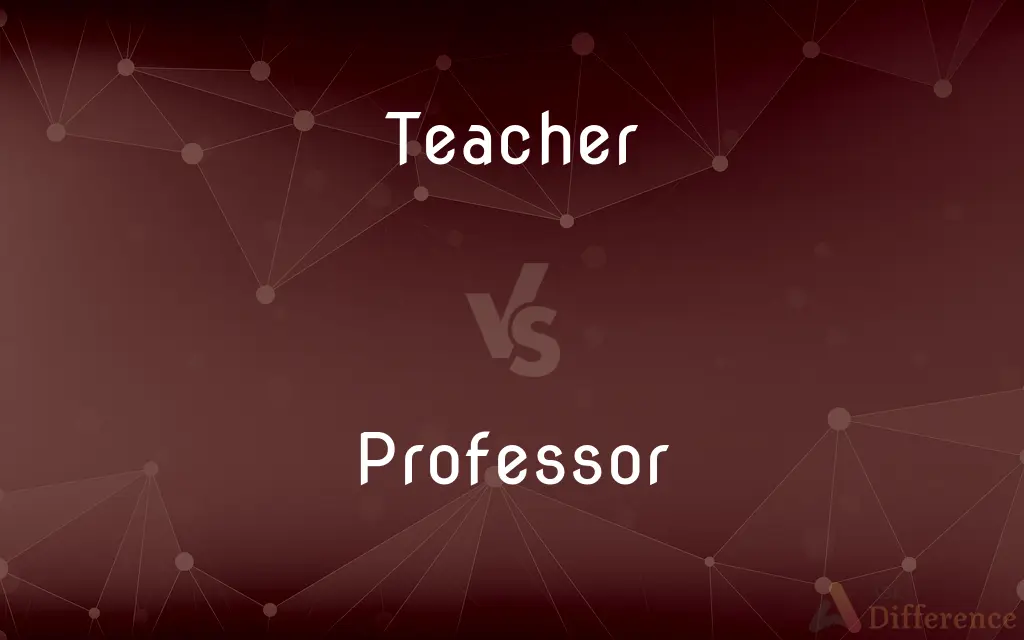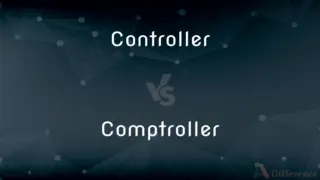Teacher vs. Professor — What's the Difference?
Edited by Tayyaba Rehman — By Urooj Arif — Updated on March 25, 2024
A teacher is a professional who imparts knowledge or skills at various educational levels, while a professor is a college or university faculty member specializing in a particular academic field.

Difference Between Teacher and Professor
Table of Contents
ADVERTISEMENT
Key Differences
Teachers work across all levels of education, from preschool to high school, focusing on a broad curriculum or specific subjects. Professors, on the other hand, are typically found in higher education institutions like colleges and universities, where they teach specialized courses, conduct research, and publish their findings.
While teachers are primarily responsible for creating lesson plans, grading assignments, and managing classrooms to facilitate learning, professors also have the added responsibilities of advising students, engaging in scholarly research, and contributing to their academic field. This distinction highlights the different roles and expectations within the educational landscape.
The qualification requirements for teachers vary depending on the educational level and jurisdiction but generally include a bachelor’s degree and a teaching certification. Conversely, professors usually hold a Ph.D. or other terminal degree in their field, underlining the higher level of expertise expected of them.
Teachers play a crucial role in early childhood development, foundational education, and preparation for higher education or the workforce. Professors contribute to the advancement of knowledge, mentorship of future professionals, and the academic and professional development of their students.
In terms of professional development, teachers often pursue continuing education and professional development opportunities to maintain their certification and stay updated on educational practices. Professors may focus on research, publishing, and presenting at conferences as part of their professional growth and to achieve tenure or promotion within their institutions.
ADVERTISEMENT
Comparison Chart
Educational Level
Preschool to high school
Colleges and universities
Main Responsibilities
Teaching, grading, classroom management
Teaching, research, advising
Qualifications
Bachelor’s degree, teaching certification
Ph.D. or terminal degree
Role in Education
Impart foundational knowledge and skills
Advance knowledge, mentor professionals
Professional Growth
Continuing education, workshops
Research, publishing, conferences
Compare with Definitions
Teacher
A professional who assesses students' progress.
The teacher graded essays over the weekend.
Professor
A scholar contributing to academic knowledge.
The professor presented his findings at an international conference.
Teacher
A person who provides guidance and instruction in a school.
She became a teacher to inspire young minds.
Professor
A higher education instructor specializing in a field of study.
The professor of anthropology published a groundbreaking study.
Teacher
Someone responsible for the development of learners’ abilities.
As a science teacher, he conducted experiments to engage students.
Professor
A faculty member at a college or university.
He was a popular professor known for his engaging lectures.
Teacher
An educator who helps students acquire knowledge or skills.
The math teacher assigned homework every day.
Professor
Someone who advises students academically.
The professor guided her students through their thesis projects.
Teacher
An individual who facilitates classroom learning.
The history teacher used documentaries to make lessons engaging.
Professor
An academic expert who conducts research.
As a professor, she spent summers doing fieldwork.
Teacher
A teacher (also called a schoolteacher or formally, an educator) is a person who helps students to acquire knowledge, competence or virtue. Informally the role of teacher may be taken on by anyone (e.g.
Professor
Professor (commonly abbreviated as Prof.) is an academic rank at universities and other post-secondary education and research institutions in most countries. Literally, professor derives from Latin as a "person who professes".
Teacher
One who teaches, especially one hired to teach.
Professor
A college or university teacher who ranks above an associate professor.
Teacher
A person who teaches, especially one employed in a school.
Professor
A teacher or instructor.
Teacher
The index finger; the forefinger.
Professor
One who professes.
Teacher
An indication; a lesson.
Professor
The most senior rank for an academic at a university or similar institution, informally also known as "full professor."
Teacher
(Mormonism) The second highest office in the Aaronic priesthood, held by priesthood holders of at least the age of 14.
Professor
A teacher or faculty member at a college or university regardless of formal rank.
Teacher
One who teaches or instructs; one whose business or occupation is to instruct others; an instructor; a tutor.
Professor
(archaic) One who professes something, such as a religious doctrine.
Teacher
One who instructs others in religion; a preacher; a minister of the gospel; sometimes, one who preaches without regular ordination.
The teachers in all the churches assembled.
Professor
A pianist in a saloon, brothel, etc.
Teacher
A person whose occupation is teaching
Professor
The puppeteer who performs a Punch and Judy show; a Punchman.
Teacher
A personified abstraction that teaches;
Books were his teachers
Experience is a demanding teacher
Professor
One who professed, or makes open declaration of, his sentiments or opinions; especially, one who makes a public avowal of his belief in the Scriptures and his faith in Christ, and thus unites himself to the visible church.
Professor
One who professed, or publicly teaches, any science or branch of learning; especially, an officer in a university, college, or other seminary, whose business it is to read lectures, or instruct students, in a particular branch of learning; as a professor of theology, of botany, of mathematics, or of political economy.
Professor
Someone who is a member of the faculty at a college or university
Common Curiosities
What qualifications are necessary for a professor?
Professors usually hold a Ph.D. or terminal degree in their field of study.
What distinguishes a professor from a teacher?
Professors work in higher education, focusing on specialized teaching, research, and academic advising.
What qualifications are needed to become a teacher?
Typically, a bachelor’s degree and a teaching certification are required.
Can teachers work in higher education?
Yes, but they are often referred to as instructors or lecturers, depending on their qualifications and the institution.
What impact do teachers have on society?
Teachers shape future generations, imparting the essential knowledge and skills needed in society.
What is the importance of teachers in education?
Teachers play a crucial role in foundational education and the development of skills and knowledge.
What is the primary role of a teacher?
Teachers are responsible for imparting knowledge and skills, creating lesson plans, and managing classrooms.
What roles do professors play in a student’s education?
Besides teaching, professors mentor students, guide them through research, and help in their professional development.
How do teachers and professors approach professional development?
Teachers pursue workshops and continuing education, while professors focus on research and scholarly publications.
What is tenure for a professor?
Tenure is a permanent job status that protects academic freedom, typically awarded after a probationary period of research, teaching, and service.
How do professors contribute to their field?
Professors conduct research, publish scholarly articles, and present at conferences.
Is a professor higher than a teacher?
The terms refer to different contexts rather than a hierarchy, with professors specializing in higher education.
What impact do professors have on academic fields?
Professors contribute to the advancement of knowledge, mentor future professionals, and influence academic and research directions.
Can a teacher become a professor?
Yes, with additional qualifications, such as a Ph.D., and by meeting other academic requirements.
Do professors only teach?
No, professors also conduct research, advise students, and engage in academic service.
Share Your Discovery

Previous Comparison
Controller vs. Comptroller
Next Comparison
USA vs. USAuthor Spotlight
Written by
Urooj ArifUrooj is a skilled content writer at Ask Difference, known for her exceptional ability to simplify complex topics into engaging and informative content. With a passion for research and a flair for clear, concise writing, she consistently delivers articles that resonate with our diverse audience.
Edited by
Tayyaba RehmanTayyaba Rehman is a distinguished writer, currently serving as a primary contributor to askdifference.com. As a researcher in semantics and etymology, Tayyaba's passion for the complexity of languages and their distinctions has found a perfect home on the platform. Tayyaba delves into the intricacies of language, distinguishing between commonly confused words and phrases, thereby providing clarity for readers worldwide.















































